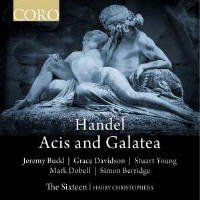Texte paru dans: / Appeared in: |
|
|
Outil de traduction (Très approximatif) |
|
|
Reviewer:
Lindsay Kemp As David Vickers pointed out in his Gramophone Collection article last October, it took a long time for recordings of Handel’s delightful pastoral to come round to essentially the same forces – and even roles – that the composer wrote it for; this newcomer becomes only the fifth since 2007 to cast five singers in five roles and then use those same singers as the chorus alongside a minimal orchestra. Indeed, Harry Christophers’s may be the smallest yet, for its tiny band is strictly one-to-apart, the only luxury among its nine players a harp in the continuo section. Such matters do not count for everything, though, and it certainly doesn’t stop the larger-scale versions by John Eliot Gardiner (Archiv, 9/78) and William Christie (Erato, 9/99) from being rightly celebrated and enjoyed for their dramatic flair and fine singing. But there is no doubt that the smaller forces bring not only greater clarity and sweetness but also uplifting drafts of clean air that seem entirely appropriate to the work. There is greater human vulnerability and sympathy in the choruses, too. As you might expect in a performance cast from the members of The Sixteen, the singers are not the operatically outgoing sort. Rather, they offer an uncomplicated vocal beauty and intimacy which, together with that of orchestra, seems appropriate to the nature of a piece more closely related to Handel’s early Italian cantatas and serenatas than to his more recent London operas. There are pluses and minuses, of course: Grace Davidson’s Galatea sounds perfectly lovely but she can be guilty of plainness when stronger reactions to text or situation are required, while as Damon Mark Dobell gives a sensitive ‘Consider, fond shepherd’ but struggles elsewhere with passagework. Jeremy Budd’s Acis is alert and lightly forceful, however, and his final duet with Davidson as the two lovers stand up to Polyphemus’s rage sounds appropriately haunted by disaster even before the big fellow blunders in. Stuart Young’s Polyphemus, indeed, provides the most impressive singing and acting here, conjuring a monster who roars and blusters but stops short of pantomime villainy. Simon Berridge does all one could ask of him in his single aria as Coridon. Christophers conducts with style and skill, and the little orchestra plays wonderfully for him, highlighting details that can often go past unnoticed. (Perhaps a less oboe-dominated balance would have revealed even more.) His stated view of the piece as graceful, charming and innocent is well realised by his easy-going tempos and apparent concern not to be heavy-handed with the drama, but there is no doubt that it comes at a price when set beside the similarly scaled but more intense, willingly driven and vocally engaged performances conducted by John Butt (Linn, 1/09) and Christian Curnyn (Chandos, 8/18). This one has its charms, for sure, but not everyone will want things to be quite so relaxed. |
|




